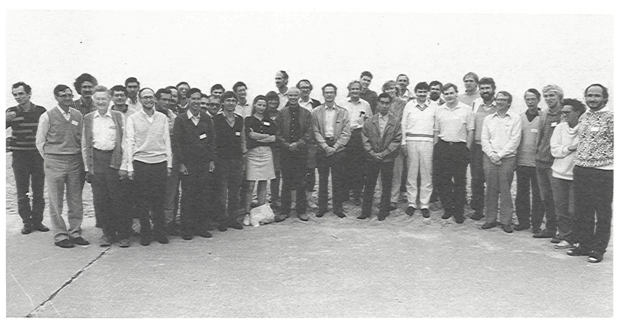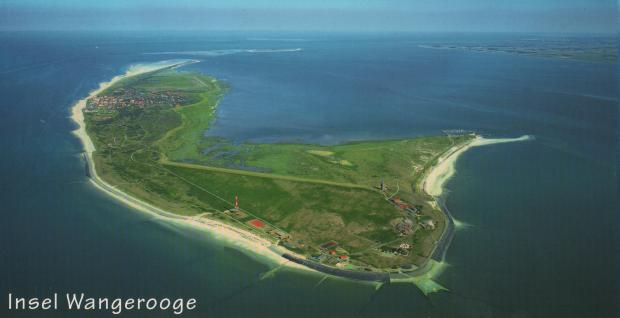Feynman (just off centre) at Wangerooge in 1987
I started my career as a theoretical physicist, and in the late-80s I co-organised a specialist workshop on a small island, Wangerooge, off the coast of Germany (see above). I tried my luck and invited Richard Feynman (I had heard he was working in this specific area) and to my surprise and delight he accepted. You can read more about him and his outstanding achievements via WikiWand. There are also a number of posts on this blog that centre on him.
Even though he was an incredibly talented and imaginative physicist, with an outstanding popular touch, it’s interesting to note that even he had occasional bouts of self-doubt.
David and Judith Goldstein write (from here, extracted):
“In the immediate aftermath of his Nobel Prize in 1965, Feynman suffered a brief period of dejection, during which he doubted his ability to continue to make useful, original contributions at the forefront of theoretical physics. It was during this time that I joined the Caltech faculty. […]
At Chicago, Feynman and I shared a suite in the Quadrangle Club, the university’s faculty club. On the evening after his talk, we had dinner at the home of friends, Val and Lia Telegdi. The next morning, I wandered down to the faculty club dining room for breakfast a bit late. Feynman was already there, eating with someone I didn’t know. I joined them, introductions were mumbled but not heard, and I sleepily drank my morning coffee.
As I listened to the conversation, it dawned on me that this person was James Watson, discoverer with Francis Crick of the double-helical structure of DNA. He had with him a typed manuscript entitled Honest Jim (the title would later be changed by the publisher to The Double Helix), which he wanted Feynman to read, in the hope that Feynman might contribute something to the dust jacket. Feynman agreed to look at the manuscript.
That evening there was a cocktail party and dinner in Feynman’s honor at the Quadrangle Club. At the cocktail party the worried host asked me why Feynman wasn’t there. I went up to the suite and found him immersed in Watson’s manuscript. I insisted that since he was the honoree, he had to come down to the party.
Reluctantly, he did, but he fled after dinner at the earliest moment permitted by civility. When the party broke up, I went back up to the suite. Feynman was waiting for me in the living room. “You’ve gotta read this book,” he said. “Sure,” I said, “I’ll look forward to it.” “No,” he shot back, “I mean right now.”
And so, sitting in the living room of our suite, from one to five in the morning, with Feynman waiting impatiently for me to finish, I read the manuscript that would become The Double Helix.
At a certain point, I looked up and said, “Dick, this guy must be either very smart or very lucky. He constantly claims he knew less about what was going on than anyone else in the field, but he still made the crucial discovery.” Feynman virtually dove across the room to show me the notepad on which he’d been anxiously doodling while I read. There he had written one word, which he had proceeded to illuminate with drawings, as if he were working on some elaborate medieval manuscript.
The word was “Disregard! ”
“That’s what I’d forgotten!” he shouted (in the middle of the night). “You have to worry about your own work and ignore what everyone else is doing.” At first light, he called his wife, Gweneth, and said, “I think I’ve figured it out. Now I’ll be able to work again!” […]


Thank you for writing this. It felt like just the thing I wanted in my life right now 🙂
I am reading ‘Genius – Richard Feynman and modern physics’ by James Gleick and I just read about you in this book before landing on this page. James have mentioned the interaction in exactly the same detail as you have mentioned. 🙂
Thank you
…and yet, many of Feynman’s best moments came from re-working or re-considering the work of others. With “Disregard!” I don’t think Feynman hit on some intellectual law of nature, but I do think it’s important to remember that everyone gets dragged down by the rat race once in a while.
I loved this. Thank you!
Another brilliant in sight by Feynman.It is so easy to get sidetracked in what really moves you.The levels of distraction are endless.Without a laser focus nothing great can be achieved.Sometimes a hermetic existence is what is required.Whatever it is you need to do “Disregarding” is paramount.
Feynman was a man I deeply would have liked to meet. A gentleman of the first rank. I have prepared a possible explanation if the intricate working of sub-atomic mechanics which may be wrong. But I feel are correct. Wish I could happen presented it to him. Perhaps in the next life.
Fantastic and wonderful! I recall reading of this incident, that Feynman said “he really didn’t know anything”, in reference to Watson before his discovery. In the book, Watson admits he wasn’t proficient in organic chemistry. Yet he tried paper or stick model representations of the DNA molecule (despite the disapproval of Rosiland Franklin, a coworker) to figure out the correct structure of the DNA molecule.
I remember reading that part in the Double Helix where, I think Crick, was asked about some bond angle. He said, “I don’t know what it is, but this is DNA”!
Oh, that is so Feynman!
So one always craves a community to discuss ideas, but one then expects community to consider one’s ideas. Usually, it tries to interrupt the idea before it is complete–hence Feynman’s insight.